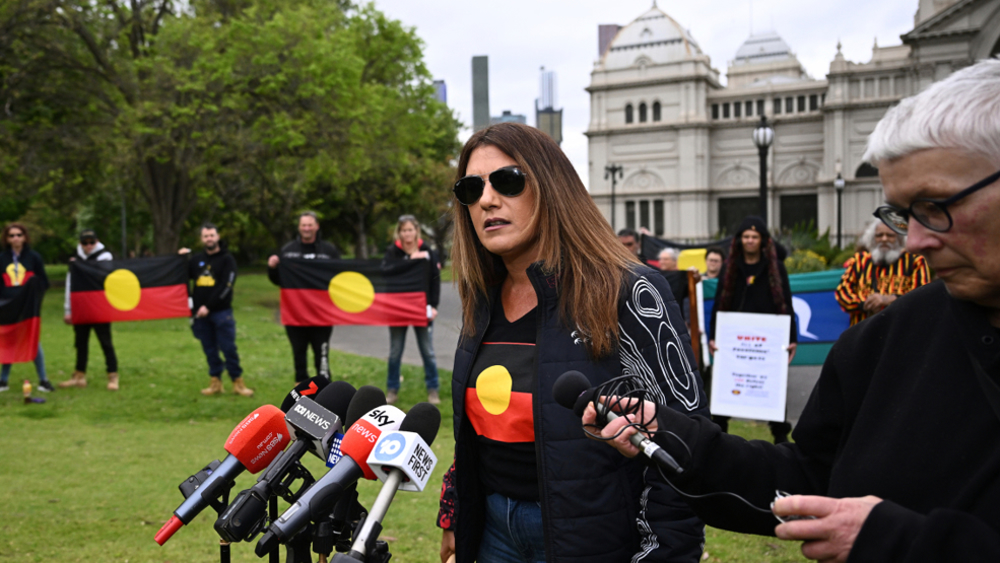Australians uphold colonial-era constitution, reject greater Indigenous rights
Australians have roundly rejected greater rights for Indigenous citizens, scuppering plans to amend the country's constitution after 230 years since British colonialism in the country.
The proposal for an Indigenous Voice to Parliament purported to tackle disadvantages of the community and move towards reconciliation, but it has instead exposed a gulf between First Nations people and the white majority.
With two-thirds of polling places reporting, 55 percent of voters had voted "no" to acknowledging Aboriginal and Torres Strait Islanders in the country's constitution for the first time, reports said.
Voice advocates had hoped that listening to Indigenous views would lead to more effective delivery of government services and better outcomes for Indigenous lives.
Opponents, however, say the Voice would be a setback for Indigenous rights imposed by non-Indigenous Australians.
“We’ve always had a voice. You’re just not listening,” Indigenous activist Susanne Levy said, referring to the wider Australian population.
Australia's First Nations peoples have lived on the continent for more than 60,000 years. For Indigenous peoples, the arrival of British colonialists heralded a period of violent subjugation, forced assimilation and enduring deprivation.
Today, Aboriginal and Torres Strait Islander people make up less than four percent of the population, but are much more likely to be sick, imprisoned or to die young than their wealthier white compatriots.
Indigenous Australians die on average eight years younger than the wider population, have a suicide rate twice that of the national average and suffer from diseases in the remote Outback that have been eradicated from other wealthy countries.
Referendums are difficult to pass in Australia, with only eight of 44 succeeding since the nation's founding in 1901. Constitutional change requires a majority of votes both nationwide and in at least four of the six states.
Almost 18 million people were enrolled to vote in the referendum, Australia's first since 1999.
Polls have consistently shown that Indigenous issues rank low on any list of public priorities for most Australians, far behind concerns like the rising cost of living.
Australian Prime Minister Anthony Albanese had made a last-ditch appeal on Saturday for Australian people to back the recognition of Indigenous people.
"I sincerely hope that Australians, when they walk into that ballot box today, vote 'Yes'," Albanese said in Sydney.
Independent Aboriginal senator Lidia Thorpe voted “no” Saturday and said Indigenous people need grassroots solutions to their problems.
“We’re not going to be dictated to by another prime minister ... on trying to fix the Aboriginal problem,” Thorpe said. “We know the solutions for our own people and our own community,” she added.
"Yes" campaigner Karen Wyatt said she was "trying to stay positive" in the face of a seemingly inevitable defeat.
But hard questions are already being asked about what a "no" vote would say about Australia, and Australians.
A rejection of the "Voice" would be "a shameful day for Australia", 59-year-old Wyatt told AFP in Sydney.
VIDEO | Tehran residents condemn US-Israel orchestrated mosque arson, vandalism
VIDEO | South Koreans demand end to joint US military drills and provocative policy against North Korea
VIDEO | A silent grief: Palestinian man struggles to recover remains of wife, children
Hind Rajab Foundation files complaint against Israeli genocidal propagandist in US
VIDEO | Trump fighting allies on Greenland
Iran FM: Selective respect for deals now haunting Europe
Arab rights group urges UK to sanction Netanyahu over 'incitement to genocide' in Gaza
‘Political, non-constructive’: Iran slams UNHRC special session on recent riots










 This makes it easy to access the Press TV website
This makes it easy to access the Press TV website